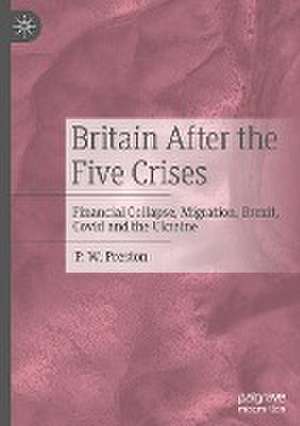Britain After the Five Crises: Financial Collapse, Migration, Brexit, Covid and the Ukraine
Autor P. W. Prestonen Limba Engleză Hardback – 3 noi 2023
Preț: 643.00 lei
Preț vechi: 756.47 lei
-15% Nou
Puncte Express: 965
Preț estimativ în valută:
123.05€ • 127.100$ • 101.59£
123.05€ • 127.100$ • 101.59£
Carte tipărită la comandă
Livrare economică 15-29 aprilie
Preluare comenzi: 021 569.72.76
Specificații
ISBN-13: 9783031436499
ISBN-10: 3031436490
Ilustrații: XIV, 268 p. 2 illus.
Dimensiuni: 148 x 210 mm
Greutate: 0.49 kg
Ediția:1st ed. 2023
Editura: Springer Nature Switzerland
Colecția Palgrave Macmillan
Locul publicării:Cham, Switzerland
ISBN-10: 3031436490
Ilustrații: XIV, 268 p. 2 illus.
Dimensiuni: 148 x 210 mm
Greutate: 0.49 kg
Ediția:1st ed. 2023
Editura: Springer Nature Switzerland
Colecția Palgrave Macmillan
Locul publicării:Cham, Switzerland
Cuprins
1.Britain: a decade of crises, 2008-2022.- 2. The British Empire: finessing the collapse, 1942-56.- 3. European Union: particular anxieties, deeper issues, 2008-22.- 4. Britain’s Financial Crisis: debts, bail-outs and austerity, 2008-10.- 5. European Union: the migration crisis, 1999-2015.- 6. Brexit Crisis: unpacking some of the lessons, 2016-22.- 7.The Covid-19 Pandemic, 2020.- 8. The Disaster in Ukraine: tracking the failures of political elites, 1991-2022.- 9. Re-imagining Britain: crises, identity and representation,1973-98.- 10. On Living in a Rich Country. - 11. Afterword
Notă biografică
P. W. Preston is Emeritus Professor of Political Sociology in the Department of Political Science and International Studies, University of Birmingham, UK.
Textul de pe ultima copertă
The period 2008–2022 has seen the British state/government embroiled in a number of full-blown crises, each impacting the fundamental operations of the state and demanding, therefore, urgent responses from the government of the day. In the first case, the 2008 near-collapse and partial nationalization of the banking system consequent upon decades of irresponsible credit creation coupled to permissive regulation; in the second , the migration crisis of 2015, which saw waves of refugees moving through Europe, provoking anxious responses from European Union member states and opening-up related political debates in Britain; thus, third , the 2016 referendum in regard to membership of the European Union, which the London-based elite clearly thought they would navigate easily before, to their evident shock, losing, an event itself precipitating further extraordinary Westminster manoeuvring; and then fourth the 2020 Covid- 19 pandemic, met with an initial casualsangfroid before the government, its actions informed by epidemiological modelling, made an abrupt shift to ‘lockdown’, with dramatic social and economic consequences. To these episodes, whose impacts run down to the present, could be added, fifth, the 2022 disaster in Ukraine where the British state/government has chosen to involve itself by supporting one set of combatants in a conflict where presently, after more than a year of fighting, there is little sign of a means to the resolution of the violence. This book examines the crises and tracks how each developed; how state/ government failings in one case were rehearsed in the next; and, more generally, how these crises have been amplified by the decades-long celebration of globalization theory; and, finally, at how following the most recent crisis the future might unfold, hence the ideas of deglobalization, resilience and, more speculatively, the possibilities of democratization.
P. W. Preston is Emeritus Professor of Political Sociology in the Department of Political Science and International Studies, University of Birmingham, UK.
P. W. Preston is Emeritus Professor of Political Sociology in the Department of Political Science and International Studies, University of Birmingham, UK.
Caracteristici
Offers a wide-ranging, holistic analysis of the crises Britain is facing Places these crises in a broader historical perspective, considering their roots and how they intersect with each other Explores the ideas of deglobalization and the new state concern for resilience
